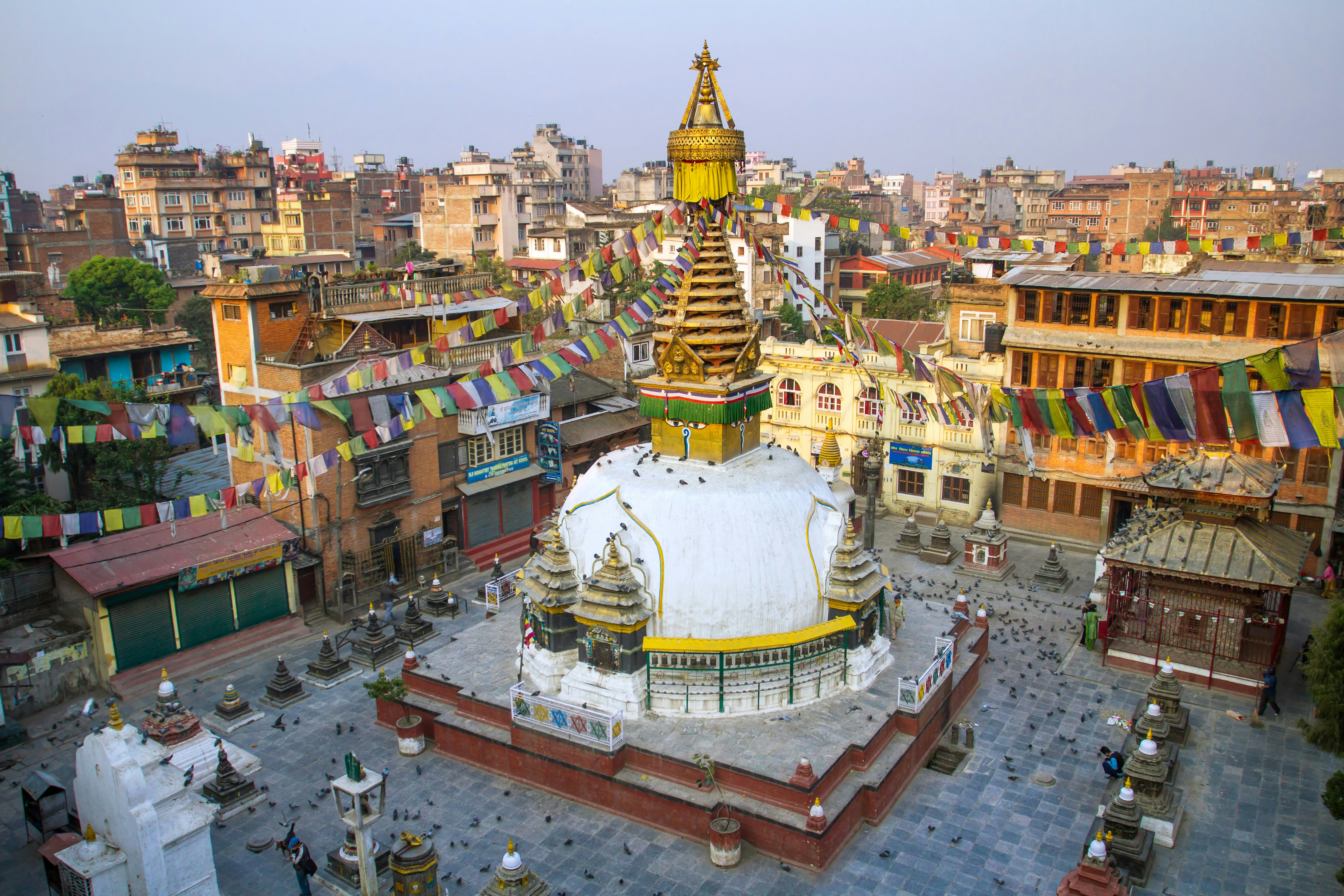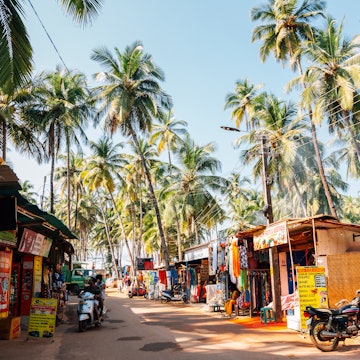

Be transported to Asia with these great reads © Richard Drury / Getty Images
With some of the oldest languages on earth, vibrant storytelling traditions, and a rich melting pot of cultures, Asia is a bookworm's dream. Literature lovers will find no shortage of myths and legends, contemporary classics, comics, poems, novels, and memoirs on the largest continent. From India to Japan, Mongolia to Sri Lanka and off into the diaspora, the body of Asian literature is both broad and deep, encompassing ancient hymns, modernist novels, accounts of war and colonial violence, and deeply personal narratives of love, family, healing, and identity.
It's impossible to try and narrow down the sheer number of books by Asian authors into a manageable list – where to begin? – but we decided to try anyhow, with 25 selections that give you a taste of countries from Bangladesh to Laos from where ever you find yourself cozying up with a good read. Whether you're gearing up for your next bucket-list trip or need a panacea for the lingering pandemic lockdowns, these books will make you feel like you've stepped into city streets and ordinary homes, from Hanoi to Hong Kong.
Our editors independently select the best products to help you have amazing travel experiences. If you purchase through links on our site, Lonely Planet may earn a commission from the retailer.
Bangladesh
A Golden Age by Tahmima Anam
It's March of 1971, and Rehana Haque is planning a special party for her children, who were taken from her in the 1950s and have since grown up into politically active university students. Soon the Bangladesh War of Independence is at their door testing their relationships as never before. Throughout what follows, Tahmima Anam makes good on her goal to make Bangladesh feel "real, not just a country to read about in the news when some disaster or other strikes," in all the homey details of Dhaka and beyond.
Cambodia
In the Shadow of the Banyan by Vaddey Ratner
"Absence is worse than death," observes Raami, early on in In the Shadow of the Banyan. "If you suddenly disappear without a trace, it's like you have never lived." So begins this finalist for the PEN Hemingway Award, rooted in Vaddey Ratner's own experiences as a young girl during Cambodia's Khmer Rouge regime before escaping to the United States in 1981. The author's fictional counterpart survives by escaping into fragments of time, place, and family before the chaos – the stories, legends, and poems her father once shared with her.
China
Do Not Say We Have Nothing by Madeleine Thien
A moving account of one musical family's fortunes amidst tumultuous changes in China on either end of the Communist Revolution, it's no wonder that Madeleine Thien's Do Not Say We Have Nothing was a Man Booker Prize finalist novel. She weaves together a sweeping adventure epic within her multi-generational drama, a story-within-a-story so beloved by some of the characters that the lines blur between their lives and that of their fictive heroes, as political forces sweep them from urban conservatories to rural factories, and even into the sands of the Gobi desert.
City Gate, Open Up by Bei Dao, translated by Jeffrey Yang
It's a common experience – returning to the place you grew up and finding it so changed that, as the author puts it, "I was a foreigner in my hometown.” But that's compounded when your hometown has gone through as radical a shift as China did during the Great Leap Forward, and when the person charting a course from memory into the present and back again is famous Chinese poet Bei Dao penning his own autobiography, set in the winding streets of Beijing.

Hong Kong
Dear Hong Kong: An Elegy to a City by Xu Xi
Writer Xu Xi grew up in Hong Kong amidst the mid-century Asian Tiger boom, and went on to run the influential low-residency, heavily international MFA creative writing program at the City University of Hong Kong, before it was shuttered by the mainland Chinese government in 2015. She's intimately acquainted with Hong Kong, and has dedicated much of her writing life to chronicling the Special Administrative Region in novels like Hong Kong Rose and The Unwalled City. But few are quite as personal, or attuned to Hong Kong's recent troubles, as Dear Hong Kong: An Elegy to a City, in which Xu Xi bids farewell to the place she's called home for most of her life, and examines what it has meant to think of herself as a Hong Konger for over half a century.
India
Chronicle of a Corpse Bearer by Cyrus Mistry
Based on a true story, Cyrus Mistry spins the tale of love across castes in the pre-independence Parsis community – that is, the descendants of the ancient Zoroastrian faith that came to India from Iran. Sepideh is the daughter of a man whose lot in life is to take the dead to the Towers of Silence (near the Pherozeshah Mehta Hanging Gardens) for the Parsi funeral rites. When Phiroze Elchidana, a priest's son, falls in love with her, ripples fan out throughout this corner of 1940s Bombay.
Essence of Camphor by Naiyer Masud, translated by Muhammad Umar Memon
It's easy for non-Indians to forget just how stunningly diverse the subcontinent is, but Naiyer Masud's masterful novel, translated from Urdu, serves as a lovely reminder. This folkloric, mystical collection of stories captures how hard it is to define India, or even its innumerable parts – from the dreamy tale of a perfume-maker to the story of a gangster's daughter who tries to walk on water to a fairy tale about an musical idol named Ba'i.
Indonesia
Home by Leila S. Chudori, translated by John H. McGlynn
Geographically split between Paris and Jakarta, Chudori's sprawling Indonesian epic finds its characters equally torn during the Suharto regime from 1965 onwards. Home explores the every day lives of ordinary Indonesians who suddenly found themselves political exiles, with a level of detail that belays Chudori's background as one of her country's best-known female journalists – from street vendors slinging sweet treats like putu to the political factions, and references to popular novels of the time.

Japan
The Great Passage by Shion Miura, translated by Juliet Winters Carpenter
Kohei Araki writes dictionaries – Mitsuya Majime collects rare books. Together, they begin work on a nearly 3000 page volume encompassing the Japanese language, treating readers of Majime's novel to a deep-dive into the intricacies of Japanese language, manners, cuisine, and identity. This delightfully postmodern work embodies the adjective tokushu, defined for Araki as "qualitatively different from the ordinary."
Tokyo Ueno Station by Yu Miri, translated by Morgan Giles
If you're looking for a novel about contemporary Japan, it's hard to imagine one more topical than Tokyo Ueno Station, which operates on the timeline and tension between the 2011 tsunami that devastated the country and the 2020 Summer Olympic games (since postponed due to the COVID-19 pandemic). Yu Miri's protagonist Kazu is literally a ghost, haunting a park near the titular station, ruminating on the disappointments and destruction he witnessed during his lifetime, and forever displaced by the impending return of the Olympics to Tokyo.
Kazakhstan
The Dead Wander in the Desert by Rollan Seisenbayev
A story of agricultural life on the steppes, one of Kazakhstan's best-known authors turns his pen to the post-independence period when the country is reeling from the aftereffects of Cold War colonialism and ecological disaster. A fisherman named Nasyr and his son Kakharman grapple with the loss of their livelihood on the Aral Sea, whose water source has been dammed by the USSR. This fictional portrayal traces the impact of a real life disaster that continues to affect Central Asia, while still celebrating Kazakh culture and community.

Laos
Mother's Beloved: Stories from Laos by Outhine Bounyavong
Celebrated for his intimate portrayal of Lao culture, Outhine Bounyavong paints fourteen moving portraits of everyday life with an almost fable-like subtlety and simplicity. Presented side-by-side in the original Lao and in translation, it's easy to see why Bounyavong has been such a mainstay in his home country through numerous changes, from monarchy to communism to the present day.
Malaysia
The Woman Who Breathed Two Worlds by Selina Siak Chin Yoke
The novel opens in 1878 and moves forward into the 1930s as the colonial landscape shifts and Indonesia and Thailand peel off from British Malaya, on up to the decades before the Japanese invasion during WWII. Protagonist Chye Hoon wants to go to school like her brother, but instead spends her time in the kitchen, frying hot chilies, brinjal, and kuay-teow – passing down the stories of her Nyonyan heritage to her ten children, who are themselves pulled towards westernization as Malaysia looks to the future. This evocative, beautifully detailed story is definitely a time-machine trip and a delectable meal all in one.
Mongolia
The Blue Sky by Galsan Tschinag, translated by Katharina Rout
Dshurukawaa, a young Tuvan shepherd boy, comes of age in the remote Altai Mountains of northern Mongolia – a 1940s childhood not unlike that of Galsan Tschinag himself. But the modern world can't help but creep ever closer, as Dshurukawaa's siblings enroll in a distant boarding school, a beloved grandmother dies, and manhood advances. Tschinag captures the flavor of Tuvan storytelling in this elegiac bildungsroman.
Myanmar
From the Land of Green Ghosts by Pascal Khoo Thwe
A member of the Padaung people born in Pekon, Pascal Khoo Thwe was attending university in Mandalay and working at a Chinese restaurant when he met John Casey, a Cambridge professor just passing through, who shared Thwe's love of James Joyce. Just a year later, swept up in the 8-8-88 Uprisings, Thwe fled for his life to the Karen state near the Thai border – and wrote to Casey in a last ditch effort for survival. This is one of those stories that proves the truth is stranger than fiction – and the author's own lived experience becomes an absolutely gripping work of biography, history, and travelogue.

Nepal
Arresting God in Kathmandu by Samrat Upadhyay
Many hear "Nepal" and think of the rural, rugged landscapes of the Himalayan Mountains – not bustling modernity. But here in Kathmandu, Upadhyay brings the domestic side of urban Nepalese life with a series of stories that delve into marriage and spirituality, love and lust, art and politics, until it feels like you've been invited in to everyday Nepal.
The Philippines
The Woman Who Had Two Navels and Tales of the Tropical Gothic by Nick Joaquin
Nick Joaquin has earned all sorts of accolades in his native Philippines, gaining comparisons to Gabriel Garcia Marquez and Mario Vargas Llosa. This collection is a good introduction to his work, including the story of Philippine emigres in Hong Kong, a play titled "A Portrait of the Artist as Filipino" set in Intramuros, and more, which delve into Catholic ritual, Manila socialites, the weight of Spanish colonial rule, and the rhythms of Tagalog.
Singapore
Ponti by Sharlene Teo
It's easy to see why Sharlene Teo is sometimes called Singapore's Elena Ferrante. Her smart, focused bildungsroman Ponti hones in on female friendship, and the changes Teo's characters undergo in their bodies, careers, and relationships become a lens for the rapid changes which Singapore has undergone over the past several decades, questioning the lengths to which one will go in order to achieve transformation.
Southeast Asia
TRASH: A Southeast Asian Urban Anthology edited by Dean Francis Alfar
Part of a trilogy of anthologies – the other two titled HEAT and FLESH – TRASH includes stories by writers from Malaysia, Singapore, the Philippines, and Indonesia. The authors each sift through the cultural and geographic ephemera of their home countries and the broader region in search of what can be kept or repurposed going forward, and what now seems outmoded. From a woman obsessed with cleaning her home to a house haunted by colonial ghosts, from squatters and immigrants to fantasy and fable, there's a lot to consider in this diverse collection.

South Korea
Please Look After Mom by Shin Kyung-sook, translated by Chi-Young Kim
Winner of the Man Asian Literary Prize, Shin Kyung-sook's Please Look After Mom was hugely popular in South Korea before it made the leap to the United States and Europe with Chi-Young Kim's expert translation. It's easy to see why – the novel delves into and challenges family relationships in contemporary Korea, and the friction with traditional roles and values, after the titular mother gets lost at a Seoul train station and her husband and children set out to find her.
Sri Lanka
The Autobiography of a Goddess by Andal Andal, translated by Priya Sarukkai Chabria and Ravi Shankar
As Mani Rao points out in the preface, "Andal's life and legend is so completely founded in the divine that merely thinking of translating Andal ought to make one speechless, struck with ineffability." And yet translators Priya Sarukkai Chabria and Ravi Shankar do incredible justice to the eighth century mystic saint's poems and spiritual odes to Lord Vishnu, written before their marriage, despite the complexity and layers to the original Tamil in which they were written. The result is a text that gives English readers a chance to delve into these deeply spiritual, often erotic, chants still sung at weddings and given space on the big Bollywood screen.
Taiwan
Two Trees Make A Forest by Jessica J. Lee
Chinese characters lends themselves beautifully to visual, as well as linguistic, plays on words – 林 or lin, the author notes, can refer to trees as well as people, dovetailing neatly with the English metaphor of the family tree. But some words, and narratives, are easier to parse than others, as Jessica Lee discovers when she delves into her Taiwanese grandfather's letters, and returns to the Formosan mountains to experience her heritage for herself, mapping her own family's history against colonial geography, and a timeless landscape.
Thailand
Arid Dreams: Stories by Duanwad Pimwana, translated by Mui Poopoksakul
"I'd waited too long to come back. This place used to be my dream vacation spot back when I was a student, but now it bore so little resemblance to its former self that I had to question my memory." So begins Arid Dreams, a collection of thirteen stories rooted in working- and middle-class Thailand, all featuring protagonists who find themselves caught in some sort of limbo, looking out at the changing world around them, yet firmly located in the side of Thailand you didn't see in The Beach.
Vietnam
The Book of Salt by Monique Truong
So often, place-based writing centers white perspectives looking in at other countries and cultures – but here, Monique Truong reverses that gaze in the story of Binh, a fictional Vietnamese cook employed by Gertrude Stein and Alice B. Toklas in 1930s Paris. The Book of Salt captures the sense of displacement of the Vietnamese diaspora, moving between colonial Saigon and pre-WWII France, and peeking in at fictive versions of some of the best-known figures of the period, including Ho Chi Minh.
An Insignificant Family by Da Ngan, translated by Rosemary Nguyen
Winner of the prize for best fiction from the Union of Writers in Hanoi in 2005, An Insignificant Family follows Nguyen Thi My Tiep, former guerrilla fighter during the American war and eventual writer, who defies convention in her quest for an authentic life. Nguyen Thi My Tiep's determination to live life on her own terms mirrors that of author Da Ngan, who grew up herself in Can Tho, served in the Southern Liberation Forces, and has since published several books about Vietnam from the US.
You may also like:
These books by African authors will transport you from Algeria to Zimbabwe
The best books to get you dreaming of European travel
Travel the US without leaving home with these top 50 books for each state
Get more travel inspiration, tips and exclusive offers sent straight to your inbox with our weekly newsletter.












